German
UCAS code R220
- Study mode
- Full-time
- Duration
- 4 years
- Start date and application deadlines
-
- Start date
UCAS code R220
German is a major language of business, commerce and science, as well as the gateway to understanding a vibrant modern multicultural society with a rich and complex past and influential cultural output. We will help you not only to become highly proficient in writing, reading, speaking and listening to contemporary German, but also to understand the society, history, politics, linguistics, culture, literature and cinema of Germany, Switzerland and Austria.
German graduates are some of the most highly sought after by employers and our German students are particularly well-placed to achieve their full potential in the workplace.
Whilst the perfection of language skills is at the heart of modern languages degrees in Liverpool, all our degrees demand a full intellectual engagement with a wide selection of areas in German studies. We research and teach German history, culture, literature and film from the 19th to 21st centuries, , linguistics and translation, and much more.
Our students participate in a number of extracurricular activities, including the regular writer-in-residence programme, the annual translation workshop organised across the Department and the Sauerkraut Cup inter-university football tournament run by the German Academic Exchange Service (DAAD). They regularly win prestigious DAAD Summer School Grants.

We’re proud to announce we’ve been awarded a Gold rating for educational excellence.
Discover what you'll learn, what you'll study, and how you'll be taught and assessed.
In year one, you will study language modules as well as foundation modules, which will introduce you to a range of topics in German history, culture and linguistics. You will also take a ‘language awareness’ module which is designed to support your language learning by sensitising you to issues in language and linguistics.
Student must take EITHER GRMN112 and GRMN134 OR GRMN105 and GRMN106.
Students with A Level German or equivalent should normally take GRMN105 and GRMN106. Students with no previous experience of learning German, or with qualifications below A Level should normally take GRMN112 and GRMN134.
Language modules must be taken in pairs.
In addition, students take 30 credits of required modules and 15 credits of optional modules in each semester.
Students may take an additional language as part of their optional modules if they wish.
Programme details and modules listed are illustrative only and subject to change.
During your second year, you will take language and cultural modules which have a strong emphasis on the history, literature and film of modern Germany, complemented by departmental modules which offer thematic approaches to cities, graphic novels and film adaptations among other subjects.
Language modules should continue from those taken in Year 1 (i.e. students who took GRMN112 and GRMN134 should take GRMN256 and GRMN278; students who took GRMN105 and GRMN106 should take GRMN207 and GRMN208).
Student take 45 credits of optional modules in Semester 1 and 30 credits of optional modules in Semester 2. Students must take AT LEAST TWO of GRMN225, GRMN218 and GRMN220.
MODL200 is subject to a suitable placement being sourced.
Up to 15 credits of optional modules may be taken from cognate subjects elsewhere in the School of Histories, Languages and Cultures with prior permission from the Subject Lead.
| Compulsory modules | Credits |
|---|---|
| EXTENDED PROJECT IN MODERN LANGUAGES (MODL250) | 15 |
| INTERMEDIATE GERMAN 5+6, YEAR 2 (GRMN256) | 15 |
| ADVANCED GERMAN 7 (GRMN207) | 15 |
| ADVANCED GERMAN 7+8, YEAR 2 (GRMN278) | 15 |
| ADVANCED GERMAN 8 (GRMN208) | 15 |
Programme details and modules listed are illustrative only and subject to change.
You will spend one year in a German-speaking country as a language assistant in a school, as a student at a partner university, or on a work placement. If you combine Major German with a Minor in another language, you will split the year abroad between a German-speaking country and another country.
Assessment during your year abroad
You will complete assessment tasks appropriate to your Year Abroad placement, either producing one or more pieces of work in German or completing modules at your host university.
Programme details and modules listed are illustrative only and subject to change.
Your fourth year brings together your interests from your second year of study, and complements the activities from your Year Abroad.
GRMN311, MODL307 and GRM312 are required modules.
Students also take 30 credits of optional modules in each semester. Students must take AT LEAST TWO of GRMN313, GRMN316, GRMN330, MODL311 or MODL312.
MODL307 is a ‘year-long’ module and represents 15 credits in each semester.
Up to 15 credits of optional modules may be taken from cognate subjects elsewhere in the School of Histories, Languages and Cultures with prior permission from the Subject Lead.
| Compulsory modules | Credits |
|---|---|
| PROFICIENT GERMAN 11 (GRMN311) | 15 |
| PROFICIENT GERMAN 12 (GRMN312) | 15 |
| DISSERTATION (MODL307) | 30 |
Programme details and modules listed are illustrative only and subject to change.
If you split your degree between German and another subject area, you will study a German language module, at beginners or advanced level, and a cultural module per semester, alongside two other modules in your other subject.
If you combine German with a non-language subject, you will spend the year abroad in a German speaking country as an assistant in a school, as a student at a university or on a work placement. If you combine German with another language, you will split the year between two countries.
You will be taught in a mixture of formal lectures, seminars and small group tutorials where a friendly environment prevails and great attention is paid to giving feedback on assessed work.
In language classes, we make every effort to ensure that we have a small number of students compared to competitor institutions, which means that academic staff are able to support students to achieve their full potential. All language modules involve continuous assessment such as oral presentations, listening tests and grammar tests as well as exams. Tuition takes place in small groups with first-language speakers playing a prominent part and includes a range of skills such as listening, writing, speaking, interpreting and translation.
Students are also expected to make regular use of our fully-refurbished Language Lounge to enhance their own study. We encourage our students to become independent learners, and support them through our dedicated library resources in the Sydney Jones Library which is open 24-hour in term time. We also make extensive use of our virtual learning environment VITAL where students can complete structured tasks outside the classroom.
Performance throughout the year is carefully monitored and used to supplement examinations. For language, such a programme of continuous assessment involves evaluating performance in a variety of written and oral exercises. Other modules have a mix of essay and exam assessment. Our aim is always to assess by methods of evaluation appropriate to the skills being developed and to allow students to gain credit for good work done during the year.
Exams take place at two points in the academic year: at the end of semester one in January and at the end of the session in May, so that the workload is evenly distributed. As regards the final degree result, for language programmes, the second year’s work counts for 20%, the work done during the year abroad (foreign exams or extended essay or portfolio) counts for another 10%, and the final year’s work counts for 70%.
We have a distinctive approach to education, the Liverpool Curriculum Framework, which focuses on research-connected teaching, active learning, and authentic assessment to ensure our students graduate as digitally fluent and confident global citizens.
The Liverpool Curriculum framework sets out our distinctive approach to education. Our teaching staff support our students to develop academic knowledge, skills, and understanding alongside our graduate attributes:
Our curriculum is characterised by the three Liverpool Hallmarks:
All this is underpinned by our core value of inclusivity and commitment to providing a curriculum that is accessible to all students.
The qualifications and exam results you'll need to apply for this course.
| Qualification | Details |
|---|---|
| A levels |
BBC |
| BTEC Level 3 national extended diploma |
DDM. |
| BTEC combinations |
BTEC National Diploma DM plus B at A level; BTEC National Extended Certificate M plus BB at A level. See Key course information. |
| Welsh Baccalaureate Advanced |
C in the Welsh Baccalaureate, plus BB at A level. |
| Access |
Pass relevant Access to HE Diploma with 45 Level 3 credits with 27 at Distinction and 18 at Merit. |
Studying with us means you can tailor your degree to suit you. Here's what is available on this course.
University of Liverpool students can choose from an exciting range of study placements at partner universities worldwide.
Broaden your world by spending an additional year of study at a partner university abroad following your second year of study.
Every student at The University of Liverpool can study a language as part of, or alongside their degree. You can choose:
With a combined degree, you can study two subjects as part of the same degree programme.
Teaching is delivered by the Department of Languages, Cultures and Film, who bring together experts in a wide range of disciplines. A cutting edge research programme and award-winning teaching provide great opportunities to study all aspects of language and culture within a global context.
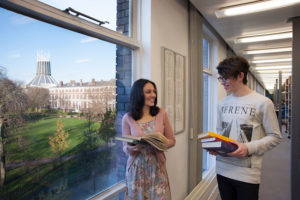
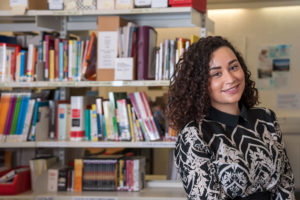
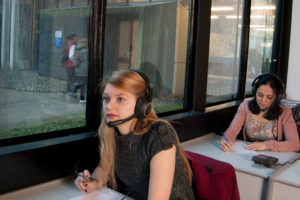

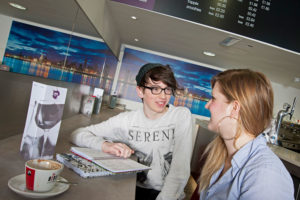
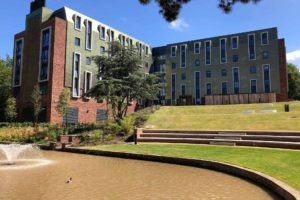
From arrival to alumni, we’re with you all the way:

Want to find out more about student life?
Chat with our student ambassadors and ask any questions you have.
Engage with topical historical, cultural and topical debates.
Studying German goes beyond preparing students for a specific career, as the skills learned offer many possibilities. The Higher Education Statistics Agency consistently records high employment levels for language graduates, and the employability of graduates in German is excellent.
You will be equipped for graduate opportunities requiring competence in German, breadth of outlook, sympathetic understanding of other cultures, efficient selection and deployment of information from written sources, critical and evaluative judgements and excellent standards of literacy.
We have excellent links with a wide-range of German employers across all sectors: from financial to energy companies, manufacturers to retailers, including
These links are used frequently to help students find work placements on the Year Abroad or to secure graduate jobs.
82% of languages, cultures and film students are in work and/or further study 15 months after graduation.
(Discover Uni, 2018-19.)
Your tuition fees, funding your studies, and other costs to consider.
Full-time place, per year - £9,535
Year abroad fee - £1,430 (applies to year in China)
Full-time place, per year - £24,100
Year abroad fee - £12,050 (applies to year in China)
The tuition fees shown are correct for 2025/26 entry. Please note that the year abroad fee also applies to the year in China.
Tuition fees cover the cost of your teaching and assessment, operating facilities such as libraries, IT equipment, and access to academic and personal support. Learn more about paying for your studies.
We understand that budgeting for your time at university is important, and we want to make sure you understand any course-related costs that are not covered by your tuition fee. This could include buying a laptop, books, or stationery.
Find out more about the additional study costs that may apply to this course.
We offer a range of scholarships and bursaries that could help pay your tuition and living expenses.
If you’re a UK student joining an undergraduate degree and have a household income below £35,000, you could be eligible for a Liverpool Bursary worth up to £2,000 for each year of undergraduate study.
Apply for an Asylum Seekers Scholarship and you could have your tuition fees paid in full and receive help with study costs. You’ll need to have applied for asylum in the UK, or be the dependant of an asylum seeker, and be joining an eligible undergraduate degree.
If you’ve spent 13 or more weeks in Local Authority care since age 14, you could be eligible for a bursary of £3,000 per year of study. You’ll need to be a UK student joining an eligible undergraduate degree and be aged 28 or above on 1 September in the year you start.
Are you a UK student with a Black African or Caribbean heritage and a household income of £25,000 or less? You could be eligible to apply for a Cowrie Foundation Scholarship worth up to £8,000 for each year of undergraduate study.
If you’re a UK student identified as estranged by Student Finance England (or the equivalent UK funding body), you could be eligible for a bursary of £1,000 for each year of undergraduate study.
Joining a School of Biosciences degree and have a household income of less than £25,000? If you’re a UK student, you could apply to receive £4,500 per year for three years of your undergraduate course.
Do you live in the Liverpool City Region with a household income of £25,000 or less? Did neither of your parents attend University? You could be eligible to apply for a Nolan Scholarship worth £5,000 per year for three years of undergraduate study.
Are you a UK student with a household income of £25,000 or less? If you’ve participated in an eligible outreach programme, you could be eligible to apply for a Rigby Enterprise Award worth £5,000 per year for three years of your undergraduate degree.
Are you a UK student with a household income of £25,000 or less? Did neither of your parents attend University? You could be eligible to apply for a ROLABOTIC Scholarship worth £4,500 for each year of your undergraduate degree.
Apply to receive tailored training support to enhance your sporting performance. Our athlete support package includes a range of benefits, from bespoke strength and conditioning training to physiotherapy sessions and one-to-one nutritional advice.
Joining a degree in the School of Electrical Engineering, Electronics and Computer Science? If you’re a UK student with household income below £25,000, you could be eligible to apply for £5,000 a year for three years of study. Two awards will be available per academic year.
If you’re a young adult and a registered carer in the UK, you might be eligible for a £1,000 bursary for each year of study. You’ll need to be aged 18-25 on 1 September in the year you start your undergraduate degree.
Use our handy chatbot for your Clearing enquiries.
Last updated 17 June 2025 / / Programme terms and conditions